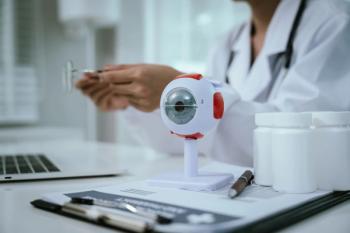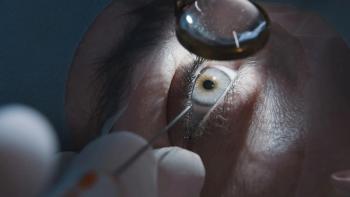
OD Q&A: Millicent Knight, OD
He asked for a recommendation, and they suggested that he take me to the Illinois College of Optometry because they do very comprehensive eye examinations. I went, and it was determined that I needed vision therapy. Once a week I went to vision therapy. My father says I was about 8, he picked me up from vision therapy and I matter of factly said to him, “Dad, I’m going to be an eye doctor.” And he said, “Oh. Great. You’re 8.”
What made you choose optometry as a career?
I have to reflect back on a conversation with my dad. He said that he was sent home a note from school saying that they suspected I had some vision problems and that I should have an eye examination. He asked for a recommendation, and they suggested that he take me to the Illinois College of Optometry because they do very comprehensive eye examinations. I went, and it was determined that I needed vision therapy. Once a week I went to vision therapy. My father says I was about 8, he picked me up from vision therapy and I matter of factly said to him, “Dad, I’m going to be an eye doctor.” And he said, “Oh. Great. You’re 8.” [laughs]
What motivated you to go from hospital-based optometry to private practice?
Even though I knew I enjoyed a hospital-base practice, in my mind I knew I always wanted to be a business owner and I wanted to be in private practice. I did a volunteer mission to Costa Rica where I met a couple from Evanston (IL) who had a practice and were close to retirement age, so they suggested that I should consider buying their practice. I wasn’t that familiar with Evanston, so I worked part-time there to see if the patients would be receptive to me and if it was a good community. After doing that for a while, that particular situation didn’t quite work out, but I found another optometrist actually just down the street who was more serious about selling his practice. I bought his practice, hired him back, and then we worked together for about 10 years. He was 70 at the time and retired at 80.
How did you get involved in ocular nutrition?
I have always been interested in more of a holistic approach to my own personal health care. Over the years, patients would ask me if there were any other alternatives, and I would do the research for them individually. I really got intrigued by it. I decided that I wanted to get more certification and more background, so I did a certified health coaching program that took a year. Then I decided to enroll in the American Academy of Anti-Aging Medicine, and I did a fellowship through them.
Have you noticed that there’s more patient engagement with nutrition?
I’ve noticed a tremendous increase in that. As a part of North Shore Eye Center, we did a spin-off from our conventional practice and developed the Integrative Eye & Wellness Center. It’s more a consultation practice, it also has nutraceuticals, and we work with other healthcare practitioners with a holistic bent. The first patient who contacted us told me that he took a train, two buses, and walked almost a mile to get us because he was so unhappy with conventional eye care. It shows you just how committed people are to getting what they want.
What it's like to be part of a two-doctor couple while raising a family?
It’s very funny - I have a lot of younger practitioners who are just starting in their careers ask me what they should look for in a spouse. At first I joked that what you really need is a wife [laughs], but I think what you really, really need and what I am very blessed to have is a true partner. He has a vested interest in his career, but he also has a vested interest in our son, his upbringing, and being an integral part of that. We really work well together, he supports me, and I support him, and it just works.
How are the demographics of optometry changing, and what are their challenges?
When I started in optometry school, it was the first incoming class that was going to have this significant number of women-the profession was up in arms about that. My class was going to have 25 percent females, which was unusual at that time. My first week in school, one of my professors asked me if I was sure that this was something that I wanted to do because I was taking the slot of a man who needed to feed his family. I politely said, “Yes, I am sure. Thank you.” [Laughs] My hat goes off tremendously to Dr. Janice Jurkus for being the only female. The classes are now 60-70 percent female, and a large percentage of those females are Asian-Americans. There’s a lot of cultural dynamics that didn’t exist at the time I was in school, and I think that’s something the schools and the profession really have to address.
How do you see your work with Women of Vision propelling women in their careers?
One of the things I really enjoy doing, and I’ve gotten some really beautiful letters over the years, is mentoring younger women going into the profession. I’ve had a number of women come through our office who are in high school or even at the undergraduate level, and I’ve tried to shepherd them through the process and stayed in contact with them throughout optometry school. One of my mentees came to me as freshman in high school and shadowed for 20 hours. I encouraged her to come back over the summers and work. The next thing I know she was asking for a recommendation for optometry school, and then the next thing I know she was practicing with me. [Laughs]
How is your current corporate role with Vistakon different from your private practice?
It’s actually pretty different in the sense that I’m not face-to-face seeing patients anymore. But still feel like I’m advocating on their behalf by making sure that the company understands what optometrists need to provide the best care for the patients. I feel like I’m indirectly helping them by helping the company really understand optometry and the whole eye-healthcare field. Going into corporate America when you’ve been an entrepreneur and in your own practice for a lot of years, there’s a steep learning curve. I have consulted for Vistakon and several other companies over the years, so I do have some idea how corporate works, but it’s a little different when you’re an employee. I am enjoying it because one of the things I enjoyed about my practice was looking at how to best market it, strategic planning and setting goals, and engaging our staff in reaching those goals. We do a lot of similar things, just at a larger scale.
What do you do for down time?
I love to spend time with my son and my husband, and I love to walk. I live close to the lake, so I enjoy taking walks along the lake. I’m sure it’s good for my body but it really feels good for my mind.
What's it like bouncing from Chicago to Jacksonville?
We are moving at the end of the school year to Jacksonville. [Laughs] Cross your fingers, we got an offer on the house today.
What is the one thing you regret?
I can’t say I have any regrets. I’ve really tried to make the best possible contribution I could to this profession through politics, making sure that I’m actively involved and engaged in making sure that bills we need to get passed that are beneficial to optometry do so. I’ve worked in leadership through our structured organizations. I’ve volunteered in my community as well. I really don’t have any regrets.
What's the craziest thing you've ever done?
I used to go on trips with my mom a lot, we like to travel. I went whitewater rafting in the Zambezi River at Level 5, and I’d never been rafting before. That was a white-knuckle experience. [Laughs] On one of the trips traveling with my mother I took a tour of the Ice Bar in Stockholm, Sweden. As a disclaimer, she did not go with me, I went by myself. You go in, they put this mink on you, and the bar all encased in ice. They serve you lots of tasty drinks that happen to have vodka in them. I met some very interesting people, but you can’t stay for longer that 30 minutes. It is just that cold, and you aren’t always aware of it because you’re having these drinks.ODT
More from OD Q&A:
Newsletter
Want more insights like this? Subscribe to Optometry Times and get clinical pearls and practice tips delivered straight to your inbox.





